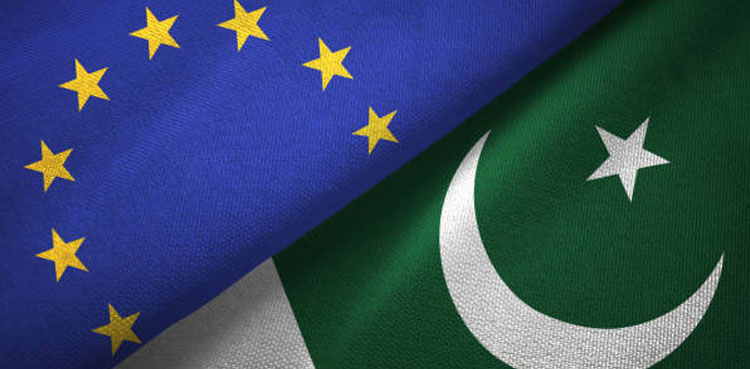- Web
- Feb 05, 2026
Pakistan faces export challenges to EU as key products enter ‘retreat’ category
-

- Web Desk Karachi
- Jan 13, 2025

KARACHI: The Pakistan Business Council (PBC) has highlighted a serious risk for Pakistan as a significant proportion of its crucial exports to the European Union (EU) fall into the ‘retreat’ category. Both Pakistan’s exports to the EU and the EU’s global imports in these product lines are relatively low, indicating limited opportunities for growth.
The PBC warns that if Pakistan continues to concentrate on these stagnant product lines, it may encounter severe challenges in the coming years, potentially leading to a substantial decline in exports to the EU. In 2023, the EU’s top import from Pakistan was men’s or boys’ cotton trousers and related clothing, valued at €722.9 million ($818 million). However, this category experienced a-negative compound annual growth rate (CAGR) of -2.7 percent from 2019 to 2023.
The EU’s Generalized Scheme of Preferences (GSP Plus), which has been extended until 2027, is currently under renewal discussions for the 2024-2034 period. This renewal will introduce new requirements for beneficiary countries, such as the ratification of five additional conventions regarding environmental and labour standards. The proposed changes enhance conditionality and withdrawal procedures, meaning Pakistan must meet the new criteria, once announced, to retain its GSP Plus status beyond 2027.
The GSP Plus scheme offers zero-rated tariffs, significantly boosting Pakistan’s competitiveness, particularly in textiles, allowing it to effectively compete with countries like China and India. While Pakistan has enjoyed the benefits of GSP Plus for the past decade, future eligibility is uncertain due to stricter criteria and additional conditions in the coming programme. Failing to qualify could result in reverting to the EU’s standard GSP, providing fewer trade benefits. Although Pakistan may still qualify for standard GSP, losing GSP Plus status would lead to diminished market access and increased tariffs.
Also read: Rising food exports drive prices up for local consumers
To address these challenges, the PBC recommends that Pakistan work to retain its GSP Plus status, negotiate new preferential arrangements with the EU, and realign its export strategies to focus on high-demand European products to protect its market position and substantial market share. If no action is taken, Pakistan risks losing its competitive edge, which would negatively impact export growth to the EU.
To fully leverage the EU GSP Plus scheme and mitigate the risk of its withdrawal, Pakistan must diversify its export portfolio beyond textiles and leather goods.
Sectors such as organic chemicals, pharmaceuticals, and machinery present untapped potential. Expanding into these categories could lessen dependence on a narrow range of products and better utilise current tariff concessions. Investments in emerging products like knitted apparel and sportswear, which are showing positive growth trends, can also enhance Pakistan’s competitive advantage.
Exporters should be encouraged to diversify into high-growth products, supported by government initiatives such as innovation subsidies, access to finance, and skill development programs. Engaging with international buyers to align product development with market trends could further boost competitiveness and strengthen Pakistan’s export portfolio.
Promoting eco-friendly production processes and obtaining certifications for sustainable goods will help align Pakistani exports with EU consumer preferences and regulatory standards, ensuring compliance and reinforcing Pakistan’s position in the environmentally conscious market.
Exploring untapped EU markets in Central and Eastern Europe presents new growth opportunities. Tailored marketing campaigns, trade missions, and logistical support will be vital for penetrating these markets.
Improving trade infrastructure—upgrading port facilities, transportation networks, and digital customs systems—will reduce export lead times and enhance competitiveness.
Effective trade policy development must involve collaboration between government bodies, exporters, and EU stakeholders. Regular consultations will ensure policies are relevant and responsive to market dynamics, while periodic reviews of export performance and adjustments based on emerging opportunities will optimise trade strategies.




